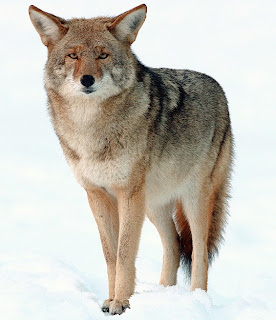Coyotes, wolves, and coy-dogs
After hearing the coyotes howl for the last few nights, I read a little about the animal. One bit of trivia I picked up is that the word "coyote" comes from the Aztec word "coyotl", which is often translated as "trickster."
I came across some interesting spellings of the animal's name in old books: "cayute," "cayota," "cayeute," and so on. Today we have standardized the spelling, but pronunciations still vary. According to Merriam Webster's entry for the word, the primary pronunciation is \kī-ˈō-tē\ but in the West, it's sometimes pronounced \ˈkī-ˌōt\.
 |
| Coyote in Yosemite National Park Photo source: Wikipedia |
On the rare occasion that I heard someone say \kī-ˈō-tē\ , it was obvious to me that they knew coyotes only from watching "Wile E. Coyote" on TV. To me, the three-syllable pronunciation was an overly-fancy version that only a dude would say.
Over the years, I've amended that preconceived notion because I've learned that many rural folks in other parts do say \kī-ˈō-tē\. However, I haven't changed my own way of saying the word. The three-syllable pronunciation will never feel right in my mouth.
I've also heard lots of people call them "wolves." But in my internal dictionary, the word "wolf" is used only for the larger wild dogs. To me, calling them "wolves" would feel just as silly as calling them \kī-ˈō-tēs\.
I base my mental image of a coyote on the animal I knew during my Nebraska childhood. The average male coyote there weighed maybe 30 lbs. But in the eastern U.S., the native coyote is a bigger animal -- at least a third bigger on average (10 to 15 lbs. heavier) -- than the Nebraska coyote. DNA testing has revealed that some eastern coyotes carry wolf genes as a result of coyotes and wolves mating with each other.
So my notion that no coyote should be called a wolf is probably wrong, too. I read that these crossbreed coyotes are called "coy-wolves." Now I wonder how they pronounce that first syllable, "coy." Is it \ˈkī\ or is it \ˈkȯi\?
 |
| Range map of the coyote Image from Wikimedia |
Website of Jonathan Way, Ph.D., a Coy-Wolf expert
4 comments:
You're right about Nebraska pronunciation. In Lincoln we rhymed coyote with my oat. Can't place why or when I switched to three syllables. Maybe when we lived in Oklahoma. And tonight my robot test word is Keeurop. How could we say that?
I'm grew up in Oklahoma. We used the three syllable pronunciation...but we do use a lot of three syllables for a lot of one and two syllable words.
Received from Bob by email:
I lived in Arthur NE. Yes when anyone pronounced coyote with a long E we always knew that this person was from the East. To this day when I hear it pronounced wrong my ears hurt. I explain the reason we do not use the word with a long E is because a Coy-ot-e is in reference to a unsavory human.
As we don't have a wild poulation of these, I think you will find most Brits using the three syllable pronunciation. Mainly I think in part from their main exposure to the animal being from the cartoon character. I have this mental image of a Brit being chased by one and when being asked to tell what he was running from would have to say; "I'd love to tell you but I'm not quite sure of the pronunciation!"
Post a Comment